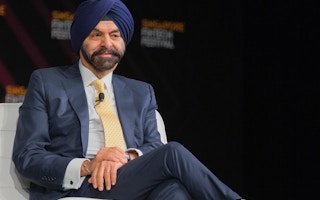Funding and resources to combat the climate crisis need to be channelled urgently from developed nations to poorer regions, but this cannot be achieved merely by taxation or calling for richer countries to pay up, given political barriers. Instead, strengthening the credibility and transparency of the voluntary carbon markets is the way forward, says Ajay Banga, the World Bank’s new president.
To continue reading, subscribe to Eco‑Business.
There's something for everyone. We offer a range of subscription plans.
- Access our stories and receive our Insights Weekly newsletter with the free EB Member plan.
- Unlock unlimited access to our content and archive with EB Circle.
- Publish your content with EB Premium.
The World Bank is looking to create reliable carbon credits where “pricing will be better and resources can move the right way”, Banga told a 3,000-strong audience at the Singapore FinTech Festival last Friday, adding that the bank is a few months away from running a mechanism for the forestry sector where it will be issuing certification for carbon credits.
This will put voluntary carbon markets, which have been plagued by transparency and integrity concerns, on a more credible footing, by making sure that there are anti-logging safeguards and people are not “reforesting in one place, but deforesting elsewhere”, said the former Mastercard chief executive. Banga was elected by the bank’s board of governors in May this year with an implicit mandate to reform the almost 80-year-old institution.
Banga, who was speaking at a fireside chat with Singapore central bank chief Ravi Menon, believes that the bank’s backing of certified green credits can improve the pricing of carbon, and ultimately get money to move in the right way: from developed country companies and investors (which typically buy the credits) to developing regions (which supply them).
Buying and selling carbon credits can allow companies and governments to address greenhouse gas emissions, although these mechanisms have suffered from a reputation problem. Just last week, South Pole, the world’s top seller of such offsets, said its chief executive Renat Heuberger is stepping down following months of allegations that the company overstated the climate impact of products that it sold.
Repurpose dirty subsidies
The decision for the World Bank to step in to run carbon markets is one out of a swath of new proposals to widen its current mandate based around poverty alleviation and shared prosperity to tackle other pressing problems such as climate and food insecurity. Over the past few months, the spotlight has been on Banga, a Wall Street veteran born and raised in India, and how he might expand the bank’s development remit with his new ideas.
At the FinTech Festival, Banga also called for subsidies with harmful environmental impacts to be repurposed. These include wasteful subsidies that support climate-wrecking fossil fuels, fertilisers and unsustainable fishing practices.
“Repurposing these subsidies can be enormously helpful in the fight on climate. It is an uncomfortable reality we have to face and there are choices we have to make to decide how we want to spend our money,” he said. “We must find a better way to spread the peanut butter.”
A World Bank report published in June said that global direct government expenditures in the agriculture, fishing and fossil fuels sectors are US$1.25 trillion a year – around the size of a big economy like Mexico.
Banga has also been outspoken on how the World Bank as well as other multilateral development banks (MDBs) can help to absorb the first wave of losses from climate-related projects, such as wind and solar projects that are marginally bankable, so that the risks are spread and private capital is more willing to come on board.
Commenting on the topic, Menon said that although the concept of using public capital to de-risk certain projects seems straightforward, it is difficult in practice and still not universally accepted. Western funds have shied away from investing in emerging market climate projects on any scale because of concerns about political and foreign exchange risks.
In response, Banga said that private investors are not willing to deal with regulator risks and this is where MDBs can come in to provide risk guarantee and insurance. The World Bank has an insurance arm that protects investments against non-commercial risks and helps investors obtain access to funding sources with improved financial terms.
“The bank should be a part of this space as this is the subject matter expertise we possess … there is a great deal of demand for that paper guarantee from us too. Private reinsurers will find it relatively more safe to back a project if the World Bank is behind it.”








